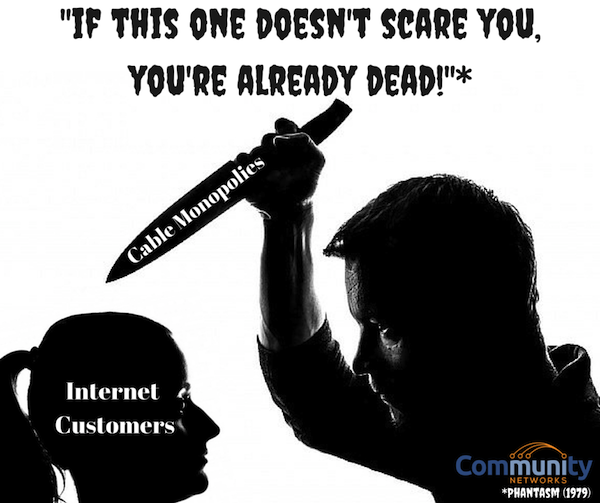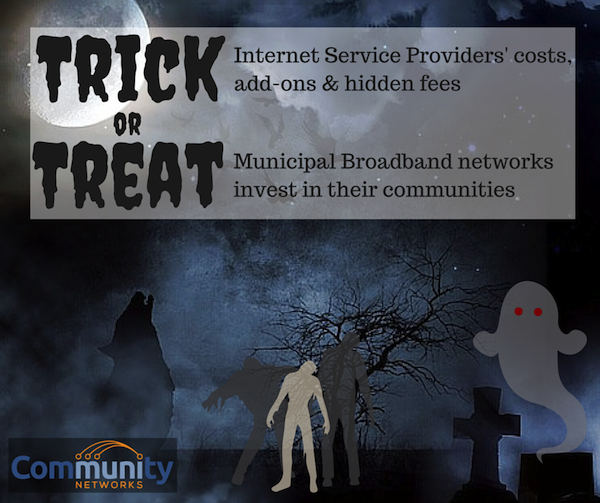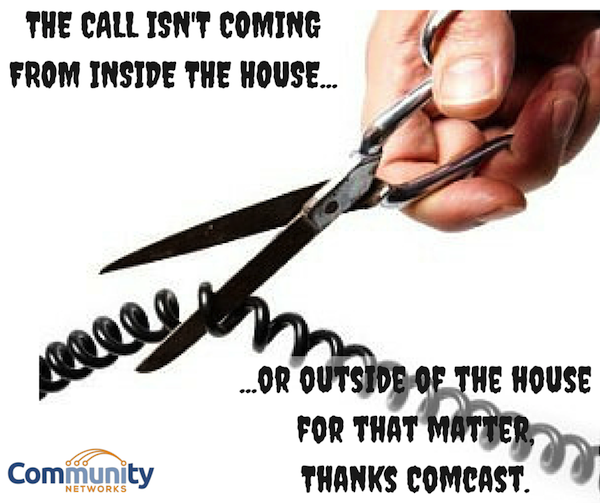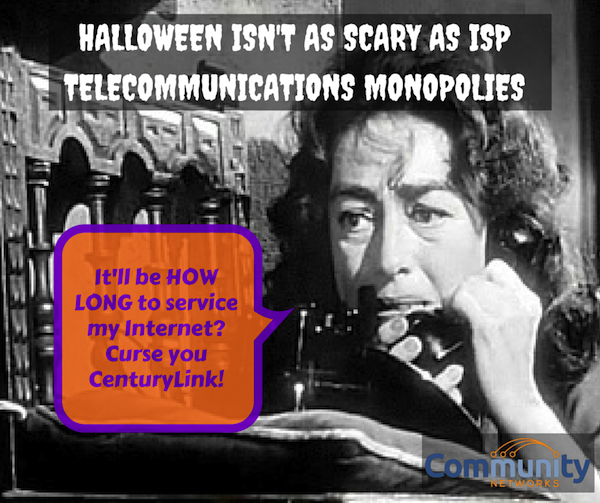
Fast, affordable Internet access for all.

AT&T lawyers filed suit against Nashville just two days after Mayor Megan Barry signed the new One Touch Make Ready (OTMR) ordinance into law. The Metro Council passed the proposal for the final time, and sent it on to the Mayor, on September 20th.
Seeking Out Streamlining
OTMR was proposed by Google Fiber, which wants to enter the Nashville market by deploying an aerial fiber network. In order to do that, they need to attach fiber-optic cables to utility poles around town, but the current process is cumbersome and will significantly delay the rollout. OTMR streamlines the procedure but would allow some one other than AT&T to manage the rearrangement of wires on all poles in the Nashville rights-of-way. The telecom giant owns about 20 percent of the poles in Nashville; the city’s electric utility, NES, owns the rest.
Three Arguments
AT&T seeks a permanent injunction to stop the city from enforcing the new ordinance. They argue the city does not have the authority to enforce the ordinance - that role is within federal jurisdiction through the FCC.
They go on to state that the Metro Council does not have the authority to pass the ordinance because, according to the city charter, only the Electric Power Board the has the right to pass regulations that deal with issues related to equipment, such as poles and the cable on them.
AT&T also asks that the court grant a permanent injunction on the basis that they already have a contract with the city relating to AT&T’s wires that are on NES poles. The contract allows the company to handle its own wires and enforcing the ordinance would basically nullify that component of the contract.
What This Is Really About
Check out this new video from the Competify coalition. The short 2-minute feature introduces viewers to Mr. and Mrs. Broadband Monopoly, who are clearly suffering from "chronic broadband access control."
Meet Mr. and Mrs. Broadband Monopoly
Competify focuses on raising awareness about the long term damage caused by lack of high-quality Internet access competition. Our livelihoods suffer when a small number of huge corporate telecommunications providers control connectivity. The coalition provides hard information on how these de facto monopolies and duopolies negatively impact our lives and how a more competitive environment can help.
Here is a statement from Competify and the Partners for the Cure:The largest data collection ever conducted by the FCC and almost a decade of advocacy by those throughout the broadband economy have finally brought us to this long-awaited milestone — the FCC’s review of the high-capacity broadband market. As the incumbents struggle to come to terms with the fact that their own behavior has given them chronic broadband access control, they seem to be trying to blame the high-capacity broadband lines they sell for their very own conduct. Here at COMPETIFY, we have a message for those critical high-speed broadband lines: from powering schools and libraries to 5G to the Internet of Things, we think you are pretty “special.” And today is a major step toward your freedom.
It’s important to note that a very common symptom of chronic broadband access control is confusion. Indeed, the large incumbent companies have gone to great lengths to explain why the lines providing vital broadband service to our businesses, hospitals, schools, government buildings, banks and countless other indispensable institutions are “not very special anymore” and are “obsolete.” By all means, if those interests insist on that point of view, then they should have no concerns whatsoever about this proceeding, as they have obviously moved on to more “special” technologies. In the meantime, the rest of the broadband economy anxiously awaits the FCC’s efforts to finally cure this diseased marketplace.
For seniors, low-income residents, and the disabled in Saint Paul, Minnesota, a Comcast discount within the city's franchise agreement is not all it was cracked up to be. The Pioneer Press recently reported that, as eligible subscribers seek the ten percent discount guaranteed by the agreement, they are finding the devil is in the details - or lack of them.
This is a warning to those who attempt to negotiate with Comcast for better service. Comcast may make deals that it knows are unenforceable.
"No Discount For You!"
For years, Comcast held the only franchise agreement with the city of St. Paul. In 2015, the city entered into a new agreement with the cable provider and, as in the past, the provider agreed to offer discounts for low-income and senior subscribers. Such concessions are common because a franchise agreement gives a provider easy access to a pool of subscribers.
It seems like a fair deal, but where there is a way to squirm out of a commitment, Comcast will wriggle its way out.
Comcast is refusing to provide the discount when subscribers bundle services, which are typically offered at reduced prices. Because the contract is silent on the issue of combining discounts, the city of approximately 298,000 has decided it will not challenge Comcast's interpretation:
The company notes that the ten percent senior discount applies only to the cable portion of a customer's bill. Comcast has maintained that it is under no legal obligation to combine discounts or promotions, and that bundled services provide a steeper discount anyway.
Subscribers who want to take advantage of the discounts will have to prove their senior status and/or their low-income status. In order to do so, Comcast representatives have been requesting a copy of a driver's license or state issued i.d.
CenturyLink Picks Up the Baton
If you pay attention to state laws affecting municipal networks in Missouri, you are experiencing an unsettling feeling of deja vu right now. On January 7, Representative Lyndall Fraker introduced HB 2078, a bill much like last year's Senate anti-muni bill. Fraker is Chair of the House Utility Infrastructure Committee, where the bill is now awaiting a hearing, so it has a good chance of being heard sooner rather than later.
Your Phone Call Required!
Time to call Members of the Committee, especially if any of them represent you, and let them know that you expect them to vote against this bill. It is anti-competitive, opposed to local authority, and prevents new investment. Bad bill!
Preventing Partnerships to Maintain The Status Quo
This bill would not only make it extremely difficult for local communities to invest in publicly owned Internet networks, but would complicate and delay public-private partnerships. A number of communities across the country already own infrastructure and are exploring ways to partner with private providers who want to use it to serve schools, businesses, and residents. If a community wants to lower telecommunications costs or obtain better services, this legislation would have them first jump through a series of obscure, expensive, and cryptic hoops. This legislation creates barriers that serve no purpose except to erect hurdles that discourage local communities from finding better providers.

For this week's Community Broadband Bits podcast, we are trying a discussion/debate format between myself, Christopher Mitchell, and Ryan Radia, Associate Director of Technology Studies at the Competitive Enterprise Institute. We have debated previously and prefer a style of seeking to flesh out the argument rather than merely trying to win it. We start by discussing the role of incumbents in limiting competition and what might be done about it.
Next we move to bandwidth caps. On both of those points, we have pretty significant disagreement. We finish by discussing the role of conduit and poles, where we have some agreement. If you like this show, please do let us know and we'll try to have more in this style.
This show is 22 minutes long and can be played on this page or via Apple Podcasts or the tool of your choice using this feed.
Transcript below.
We want your feedback and suggestions for the show-please e-mail us or leave a comment below.
Listen to other episodes here or view all episodes in our index. See other podcasts from the Institute for Local Self-Reliance here.
Thanks to Arne Huseby for the music, licensed using Creative Commons. The song is "Warm Duck Shuffle."
This time of year, goblins and ghouls are in plentiful supply. There is, however, a much scarier prospect than kids in rubber masks and bad Halloween candy: the reality of our monopolistic internet service providers. Enjoy the following images designed for Halloween and feel free to distribute widely.





In the aftermath of the Comcast/TWC merger being effectively denied by the Department of Justice and Federal Communications Commission, we thought it was a key moment to focus on antitrust/anti-monopoly policy in DC. To discuss this topic, we talk this week with Teddy Downey, Executive Editor and CEO of the Capitol Forum as well as Sally Hubbard, Capitol Forum senior correspondent and expert on antitrust.
We start off with the basics of why the Comcast takeover of Time Warner Cable posed a problem that regulators were concerned with. From there, we talk more about the cable industry and whether other mergers will similarly alarm regulators. We end with a short discussion of what states can do to crack down on monopolies and the abuse of market power.
Along the way, we discuss whether DC is entering a new era of antimonopoly policy or whether this merger was just uniquely troubling. We learned about Teddy and Sally from Barry Lynn at the New America Foundation, who we had previously interviewed for one of my favorite shows, episode 83.
This show is 24 minutes long and can be played on this page or via Apple Podcasts or the tool of your choice using this feed.
Transcript below.
We want your feedback and suggestions for the show-please e-mail us or leave a comment below.
Listen to other episodes here or view all episodes in our index. See other podcasts from the Institute for Local Self-Reliance here.
Thanks to Persson for the music, licensed using Creative Commons. The song is "Blues walk."
Stacy Mitchell, Co-Director of ILSR and Director of the Community-Scaled Economy Initiative, took a few moments to look back over the work of David Carr. Carr's work included investigating monopolies in the telecommunications space. Stacy's story, re-posted here, originally ran on ILSR.org.
What will we do without David Carr, the brilliant media columnist at the New York Times who died last week? At ILSR, we will especially miss his writing on monopoly power, Amazon, and the book business. Below we’ve excerpted and linked to a few of his best recent pieces on those subjects.
In Modern Media Realm, Big Mergers Are a Bulwark Against Rivals — July 16, 2014
Comcast’s bold strategy of acquisition kicked off a wave of defensive consolidation, fueled by a combination of fear and abundant capital in the media realm.
I talked to the head of one company that creates television and movies, who expressed a common sentiment. “When Comcast decided to get bigger,” he said, “we all had to ask ourselves, Are we big enough? We all have to think about getting bigger.”
And why not? No one is stopping them.
With big data, a Big Brother government and now big media, size creates its own prerogatives. When Amazon used its market dominance to limit access to Hachette books over a price dispute, regulators yawned. When AT&T and DirecTV propose a tie-up in response to Comcast, the market issues are just another deal point. Cable companies slowed down content from clients (which are also competitors) like Netflix, and it was treated as a business dispute.
For the most part, the current government has passed on regulating potential monopolies, and as citizens, we have become inured to the consequences of bigness.

Like many states, Minnesota has a major metro area that generally has higher quality Internet access than non-metro communities. The Greater Minnesota Partnership, a coalition of businesses, chambers, nonprofits, and cities from across the state, have made improving Internet access a major priority in their efforts to influence the state legislature.
This week, we talk with Dan Dorman, Executive Director of the Greater Minnesota Partnership. He is also a former Minnesota state Rep and remains a small business owner.
We discuss the need to improve access even as major cable lobbyists fight in the capital to preserve the status quo. The Partnership believes state barriers to community networks should be removed. Dorman offers a unique perspective as a former member of the Minnesota Legislature. He knows what it is like to be lobbied constantly by one side of the issue but rarely hear from the other. Fortunately, the Greater Minnesota Partnership is working to provide that other side as best it can. We previously discussed the Border-to-Border fund in episode 119.
This show is 28 minutes long and can be played on this page or via Apple Podcasts or the tool of your choice using this feed.
Transcript below.
We want your feedback and suggestions for the show-please e-mail us or leave a comment below.
Listen to other episodes here or view all episodes in our index. See other podcasts from the Institute for Local Self-Reliance here.
Thanks to Persson for the music, licensed using Creative Commons. The song is "Blues walk."
In the modern era in the United States, efficiency was a favorite defense by industrial autocrats like John D. Rockefeller and financial autocrats like J.P. Morgan of their used of corporate power to arbitrarily determine particularly political economic outcomes. The progressive elite, meanwhile, later turned efficiency into a veritable religion. That's why the American people learned long ago to reject efficiency as either a goal or a means to public or private governance, and why we consistently rejected it for the first two hundred years of our nation. We understood that efficiency was a code word for top-down autocratic rule by the lords and the private corporate estates or the "public" state. Hence we rejected efficiency in the Declaration of Independence and again in the Constitution. We rejected efficiency when we wrote the Sherman Antitrust Act, then reiterated our rejection time and again in our other antimonopoly laws. The Supreme Court unanimously rejected efficiency as an excuse for industrial dictatorship when it ordered the breakup of Standard Oil despite the fact that the company had lowered the cost of a gallon of kerosene by more than half. The Supreme Court unanimously rejected the efficiency argument again in 1935 when it ruled President Roosevelt's National Industrial Recovery Act unconstitutional. In every case, the American people embraced not efficiency but freedom and moved to protect that freedom through the erection of intricate systems of checks and balances designed to scatter power.